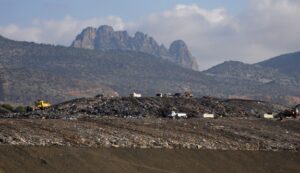
President of the Chamber of Environmental Engineers, Sibel Paralik, stated that, “The Güngör Domestic Solid Waste Landfill, designed to have a 30-year waste storage capacity, has reached its limit in just 11 years and has now become an uncontrolled dumping ground“.
Paralik cautioned that fires at the facility would increase due to improper waste storage. She noted, “In recent months, waste dumped near the area has been observed smouldering. With the arrival of summer, these fires will continue to grow exponentially“.
Environmental Targets Unachieved
Paralik claimed that none of the legislative provisions under the Waste Management section of the Environmental Law, the Packaging and Packaging Waste Regulation, or the strategies and goals outlined in the Integrated Waste Management Plan have been met.
She emphasised the need for steps to improve waste management infrastructure, determine the true amount and type of waste, reduce waste at the source, encourage reuse, and promote recycling. Paralik stated, “The failure to implement these measures has led to the rapid filling and near end-of-life status of the Güngör Regular Solid Waste Landfill”.
No Budget For Landfill Restoration
Paralik noted that the tender for the TRNC Integrated Solid Waste Management Project, which includes the rehabilitation of the Güngör Regular Solid Waste Landfill site, has not been issued. She added, “Not only has the tender not been published, but over a year has passed without a waste type study or feasibility report being prepared. It is also known that the government has not allocated a budget for the Güngör tender“.
She pointed out that there are over 50 uncontrolled dumping sites in North Cyprus, with fires frequently breaking out at these sites during the summer months. Paralik called on the government and municipalities to allocate budgets for resolving solid waste and other environmental issues and to develop short, medium, and long-term plans.



